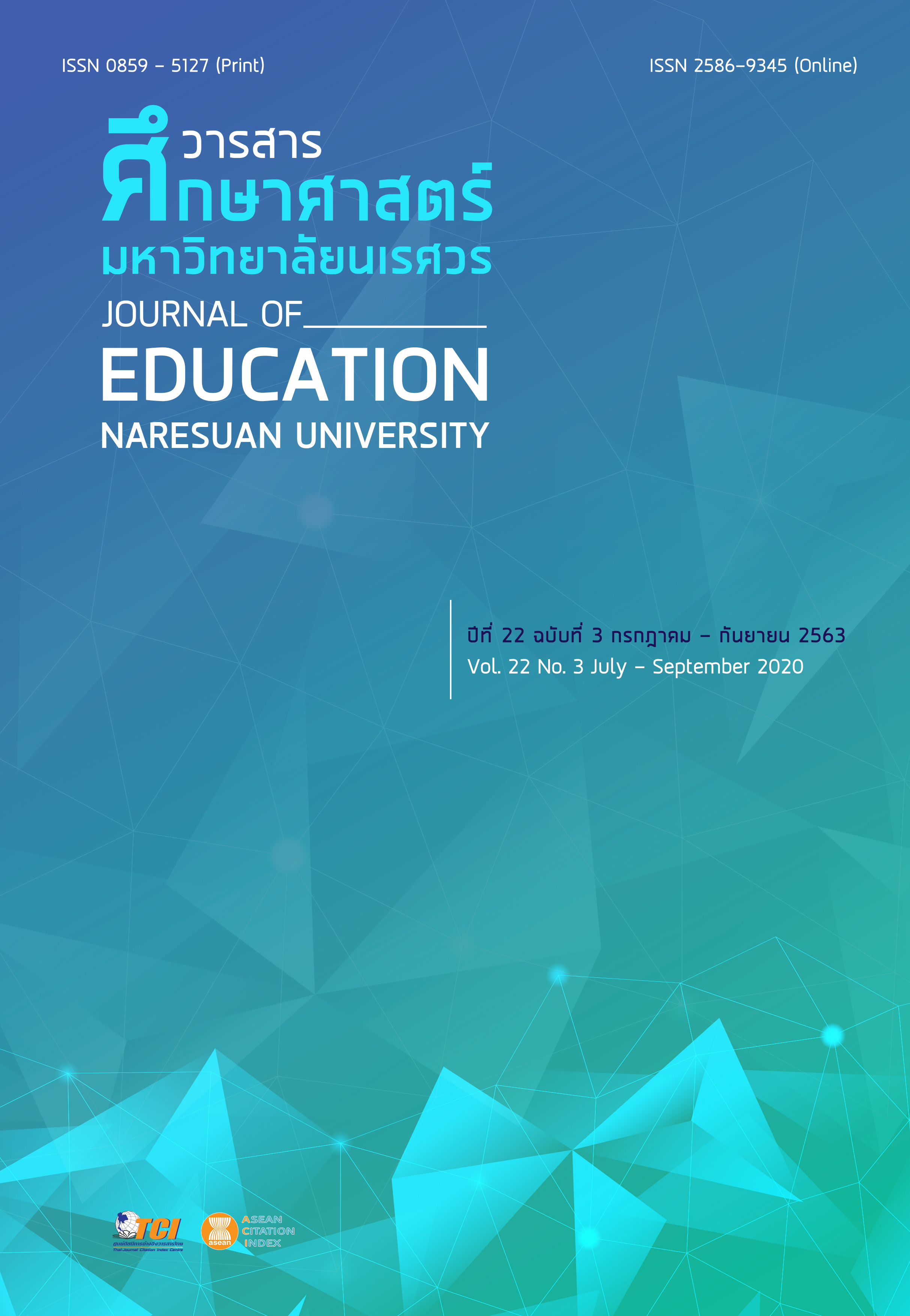MATHEMATICAL PROMBLEM SOLVING ABILITY ACHIEVEMENT AND ATTITUDE TOWARD MATHEMATICS OF MATHAYOMSUKSA I STUDENTS LEARNING BY INQUIRY CYCLE (5ES) AND POLYA’S PROBLEM SOLVING PROCESS ความสามารถในการแก้ปัญหาทางคณิตศาสตร์ ผลสัมฤทธิ์ทางการเรียนและเจตคติต่อวิชาคณิตศาสตร์ นักเรียนชั้นมัธยมศึกษาปีที่ 1 ที่เรียนโดยรูปแบบสืบเสาะหาความรู้ 5Es ร่วมกับกระบวนการแก้ปัญหาของโพลยา
Main Article Content
Abstract
The purposes of this research were: to compare the mathematical problem solving ability of Mathayomsuksa I students learning by the Inquiry Cycle (5Es) and Polya’s problem solving process with the set criterion, to compare the mathematics learning achievement of Mathayomsuksa I students by
the Inquiry Cycle (5Es) and Polya’s problem solving process, to study Mathayomsuksa I students’ attitude towards mathematics after learning with the Inquiry Cycle (5Es) and Polya’s problem solving process, and to study Mathayomsuksa I students’ learning retention after learning with the Inquiry Cycle (5Es) and Polya’s problem solving process. The sample group consisted of 43 Mathayomsuksa I students at Wangchanwittaya School, studying in the second semester of academic year 2016. The collected data were analyzed by percentage, means (x ̅), standard deviation (SD), and t-test. The findings were as follows: 1) the mathematical problem solving ability of the students that learning by the Inquiry Cycle (5Es) and Polya’s problem solving process was higher than the criterion of 70 percent at the level of significance .01, 2) the mathematics achievement of the students that learning by the Inquiry Cycle (5Es) and Polya’s problem solving process was higher than the criterion at the .05 level of significance, 3) the attitude towards mathematics in all aspects were at high level, and 4) The learning retention after learning and after learning 14 days were no significant difference in learning retention at .05 level of significance.
Article Details
The owner of the article does not copy or violate any of its copyright. If any copyright infringement occurs or prosecution, in any case, the Editorial Board is not involved in all the rights to the owner of the article to be performed.
References
Angganapattarakajorn, V. (2012). All important things for mathematics teacher; curriculum, teaching and research. Bangkok: Charansanitwong Printing. [in Thai]
Eblahim, A. (2004). The effects of traditional learning and a learning cycle inquiry learning strategy on students science achievement and attitudes toward elementary science. Retrieved October 4, 2015, form http://proguest.umi.com/pqdweb
Jiraro, P. (2015). Principles of Educational Research (5th ed.). Chonburi: Burapha University. [in Thai]
Kaewpilarom, P. (2011). The study of mathematics problem solving skill with instructional process 5Es and emphasized on Polya's problem solving steps in one-variable linear equation Mathayomsuksa I (Master thesis). Khon Kaen: Khon Kaen University. [in Thai]
Muangmongkoln, V. (2009). The study of learning activities management emphasized on basic mathematical thinking about integer system using the 5Es instruction model for mathayomsuksa I students (Master thesis). Khon Kaen: Khon Kaen University. [in Thai]
Ouppapai N. (2012). Education phychology (2nd ed.). Bangkok: V Print (1999) Printing House. [in Thai]
Peanphu, P. (2005). Education psychology (5th ed.). Bangkok: King Mongkut’s University of Technology North Bangkok. [in Thai]
Phimpalia, M. (2010). The development of learning activities focusing on mathematical problem solving process using inquiry cycle (5Es) on linear equation in mathayomsuksa I students (Master thesis). Khon Kaen: Khon Kaen University. [in Thai]
Pinmun, J. (2014). The effect of synthesization between inquiry cycle (5Es) and Polya’s promlem solving process on the topic of application of linear equation with one variable for mathayomsuksa II students (Master thesis). Chonburi: Burapha University. [in Thai]
Sintunawa, P., Nualpang, K., & Angganapattarakajorn, V. (2016). The effects of student team achievement divisions learning activity and Polya problem solving process on mathematics problems solving ability of Pratomsuksa 5 students. Journal of Education Naresuan University, 18(1), 238-250. [in Thai]
Supap, W., & Naruedomkul, K. (2018). Mathematical word problems: students’ difficulties and recommended strategies. Journal of Education Naresuan University, 18(2), 264-275. [in Thai]
The institute for the promotion of teaching science and technology. (2007). Mathematical skills and processes. Bangkok: Kurusapa Printing Ladphrao. [in Thai]
The institute for the promotion of teaching science and technology. (2011). The professional mathematics teacher: the way to success. Bangkok: Kurusapa Printing Ladphrao. [in Thai]
Wangchanwittaya School. (2014). Ordinary National Educational Test of grade 6 students and mathayomsuksa 3 according to the basic education core curriculum B.E. 2557 (A.D. 2014). Rayong: [n.p.]. [in Thai]
Wilder, M., & Shuttleworth, P. (2005). Cell inquiry: A 5Es learning cycle lesson. Science Activities, 41(4), 37-43, DOI: 10.3200/SATS.41.4.37-43


